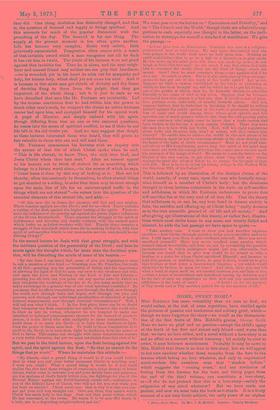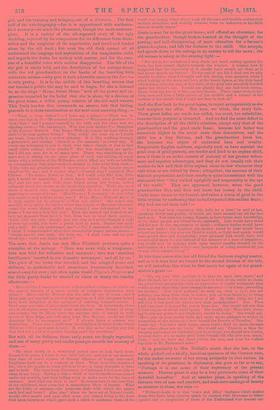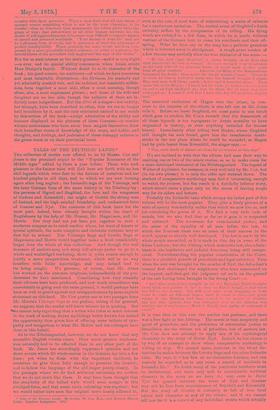HOME, SWEET HOME.*
MRS. RIDDELL has more versatility than we care to find ; we would rather, at the risk of some repetition, have studied again the pictures of passion and tenderness and solitary grief, which— though we have forgotten the story—we recall as the characteris- tics of the first fruits of Mrs. Riddell's genius, George Geith. Here we have no grief and no passion—except the child's agony at the death of her first and almost only friend—and worse than that, we have no love either, and a novel without a love-story is as sad an affair as a concert without harmony ; let melody be ever so sweet, it soon becomes monotonous. Probably it may be news to Mrs. Riddell that there is no love in this story, but we will appeal to her own candour whether three remarks from the hero to the heroine which betray no love whatever, and only to experienced novel-readers like ourselves even that "shadow before " which suggests the "coming event," and one revelation of feeling from the heroine for the hero not thirty pages from the end of the third volume, can constitute a love-story, or—if she do not pretend that this is a love-story—satisfy the exigencies of any novel whatever? But we have made our protest, and now we must take the book as it stands. It is a lively account of a not very lively subject, the early years of an orphan * Home, Sweet Home. By Mrs. J. H. Riddell. London : Tinsley Brothers. girl, and the training and bringing-out of a dauiante. The first half of the autobiography—for it is apportioned with mathema- tical accuracy—is much the pleasanter, though the more common- place. It is a" variety of the oft-repeated story of the ugly duckling, rejected by its companions for its difference from them- selves and the suspicion of its superiority, and loved and tended alone by the old duck ; but even the old duck cannot at all understand the longings and aspirations of the imaginative child, and regards the desire for society with sorrow, and for the exer- cise of a beautiful voice with serious disapproval. The life of the shy girl is nicely told, and the description of her cottage home, with the old grandmother, on the banks of the brawling little mountain stream—why give it such a horrible name as the Love?— . is very pretty. It is in the middle of this brawling stream that our heroine's public life may be said to begin, for she is listened to, as she sings "Home, Sweet Home" with all the power and ex- pression imparted by the belief that she is alone, by a denizen of the great house, a wilful young relative of the old-maid owners. This lively hoyden first commands an encore, but that failing, proceeds to a cross-examination as the next most amusing thing
What is your father ?'—'I have not a father.'—' Whet was he when you had one ?'—'He painted pictures.'—' What sort of pictures ?'- 'Like that ;' and I pointed vaguely to the hills and the trees and the rippling river.—' Oh, landscapes. Who was your mother ?'—' Daughter of old Farmer Motfiekl. The Misses Wifforde bought his land when he died.'—'Is your mother living ? Why, child,' she went on, as I shook my head, your talk is a perfect obituary. It is like walking through a graveyard, and reading "Sacred to the memory" at every step. If every one belonging to you is dead, who takes charge of you in that small white cottage down yonder ?' She was mimicking me again; but I did not care for it so much now. There was something in the mere fact of sitting on the same piece of rock and talking on equal terms with a relative of the Wiffordes, which filled me with so terrible an astonishment, that minor matters seemed to fade away from view.— I live with my grandmother,' I answered.—' And who taught you to sing?'—' No one ; and I cannot sing.'—' Cannot sing !' repeated Miss Cloeves. 'Ye stones, listen to that. If I could sing like that, little girl, I would do something. I don't know, indeed, what I would not do ;' and she rose, and with arms folded across her bosom, looked solemnly down the stream as she made this assertion. While she stood there a natural idea, suggested probably by her dress and general appearance, occurred to me. 'Miss Cleaves.' I ventured. do you think you ought to stay talking to me here ? If the Misses Wifforde knew of it, they might not ha pleased.'—' Why not, child ?' She asked this moodily. from under the shelter of her sun-bonnet.—' Because—because' —and the words almost stifled me, though I was determined to say them= I am not a lady like you.' Then she turned and looked at me, took my measure from head to foot, from foot to head back again.— ' Little girl,' she said, though you can sing as I never thought a child of your ago could, you have a great deal to learn. Genius has made you a lady. Do you understand me ?'—'No,' I answered ; albeit dimly I think I comprehended what that remarkable young person meant.— ' Genius has its own rank.' she wont on. 'I shall come and see you. Good-bye ; won't you shake hands ?' "
The news that Annie has met Miss Elizabeth produces quite a sensation at the cottage. "Here was news with a vengeance ; here was food for reflection and comment ; here was startling intelligence' inserted in our domestic newspaper; and all by me." The quiet of the home was invaded, aud the mingled peace and dullness, so pathetically and sometimes humorously described, scared away for ever ; not often again would Pilgrim's Progress and the little goody-books be wanted to cheer or weary the Sunday afternoons :— " How vividly I remember those well-thumbed volumes, in which, on the merest threads of a story, pearls of religious instruction were strung ! Mary and leer Mamma was the title of one of them ; and if Mary only got one-half so tired of her parent as I did, she must indeed have been delighted at the prospect of entering woman's estate. I liked some accounts of missionary work the best. In those books there was at all events some variety, some movement, some change of scene and people ; but in Mary, when the mamma said, intend to walk across to Moor Edge, and call upon kind Mrs. Dorcas ; would my little daughter like to accompany me ?' I always knew a sermon was impending. There was a deliberate deceitfulness in those books which filled me with a profound despair. It was like never having any jam that had not a pill or a powder lurking amid the sweetness."
But with all its dullness, those early years are deeply regretted, and one of many pretty and tender passages records her memory of them :—
" My short youth is a wonderful period now to look back upon. Counted by years, I know it was brief indeed ; and yet to my memory that time of sweet repose, of dreamy idleness, of happy innocence, lengthens itself out to a century at least. What is twelve months of life, when life begins to seem precious to us—a thing desirable to have and to hold. The days from Christmas to Christmas I feel now able to clasp in my hand. Spring is but a whiff of hawthorn-blossoms passed under my nostrils, and then fading away to make room for the roses of summer. And what are they to me ? In comparison to the rose-days of my childhood, they seem but a momentary blaze of beauty. What are the fruits of autumn—the gorgeous tints with which she paints each leaf and berry ? Alas, alas ! when we have sat at Nature's table month after month and year after year, one cannot bring to the feast that-keen.enjoyment which gave such a relish to existence when all the world was young, when others took all the care and trouble and anxiety on their shoulders, and worldly sorrows were as unknown to the little ones as worldly hopes."
Annie is sent for to the great house, and offered an education, for the grandmother, though broken-hearted at the thought of the parting, and half-disapproving of more education for a-farmer's grand-daughter, had left the decision to the child. She accepts, and speeds down to the cottage in an ecstasy to tell the news ; the old woman is asleep in the evening light :—
" She sat in her accustomed easy chair, her head resting against the back, her face turned slightly towards the window. I wonder how it happened that the expression of it should have struck me then, as it had never struck me before ! To the encl, of my life I shall not be able exactly to define what I thought and felt during that moment, while I stood looking at the worn sad face, at the lonely figure, at the thin hand which hung over one arm of the chair, at the grey hair smoothly braided under her widow's cap. I could see plainly that she had been crying. There were the traces of tears on her cheeks. There came even in her sleep now and then a little quiver of the eyelids and a tremor at the corners of her mouth that I could not bear to look at."
And she flies back to the great house, to reject as impulsively as she had accepted the offer. But here, we think, the story fails. These great ladies are made too selfish, too cruel, too unladylike, because their purpose is thwarted. And we find the same defect in the description of all the child's relatives, except only that of the grandmother and the good uncle Isaac ; because her father was somewhat higher in the social scale than themselves, and the child has a tiny fortune, and the grandmother loves her, she becomes the object of unnatural hate and cruelty. Respectable English mothers, especially such as have married the good sons of good parents, are tender and kind to an orphan child, even if there is an under-current of jealousy of her greater refine- ment and superior advantages, and they do not usually rob their mother-in-law and their little orphan niece-in-law whenever they visit them or are visited by them ; altogether, the account of their thievish propensities and their cruelty is quite inconsistent with the statement that "they walked uprightly and respectably in the eye of the world." They are appeased, however, when the good grandmother dies, and does not leave her money to the child. Uncle Isaac comes to the funeral, and raises a storm of grief in the little orphan by confessing that he had expected this sudden death ; why had she not been told ?—
" . If you had been expecting this daily for a year,' he said at last, speaking slowly and gently, 'it would not have seemed one bit the leas hard now. You were too young, Nannie, to have borne such knowledge, as we older people are forced to do, patiently, Life would have' stood still for you in the expectation of death ; ordinary duties would have been cast aside ; the laughter my mother loved to hear would have echoed no longer ; the step she liked to watch, so light and quick, would have grown slow and thoughtful ; your pleasant talk would have had a constraint upon it ; and instead of the memory of a year of happiness, you would now be looking back upon twelve months clouded by the- anticipation of a trouble which was incapable of being averted by you or any other human being.'"
Al this time comes also her old friend the German singing master, and as it is time that we turned to the second division of the tale, we will introduce him when he first meets her again at her grand- mother's grave :—
'. Soh, my poor little maiden, it is thus we meet once more ;' and Herr Droigel, for it was he, took my hand in both of his, while he shook his great head mournfully, with an expression of tender sentiment, that would at any other time have seemed to me irresistibly funny, pervading his fat face. • You have suffered,' ho went on, 'that is bad ; you eat nothing, you sleep little, that is worse ; you sit here thinking to bring back your dead to life, that is worst of all. My little child, did I not tell thee it was good for you to love your grandmother ? Yes. Then I tell thee now it is good for you to leave her. She would tall you this if that tongue so silent could speak. She would say, 'Mine love, weep- ing beside my grave is not what you should be doing.' She would say, 'Have pity on your pretty buds, and make up no garlands to wither in memoriam of one whose eyes now behold the flowers of Paradise.' She would say. 'You have shed many, many tears ; shed no more, because I am whore there are no tears.' She would say, There is a time for weeping and a time for rejoicing; you have wept; you should now rejoice, because there ars so many good kind friends left who love you much.' Come ;' and he drew my hand within his arm, and thus we walked together to Dr. Pacleman's house."
It is peculiarly to Mrs. Riddell's credit that she has, on the whole, picked out a kindly, harmless specimen of the German race, for she makes no secret of her strong antipathy to that nation. In speaking of its greatness in diplomacy, she goes so far as to say, "Perhaps it is one cause of their supremacy at the present moment. Heaven grant it may be a very proximate cause of their downfall hereafter." And at another plane, in- speaking of the German love of ease and comfort, and such surroundings of beauty as minister to these, she says :— "Without doubt it is this 'roses and lilies' business which makes those who have been thrown much in contact with Germans so bitter against and so suspicious of those of the Fatherland who honour our
country with their presence. When a man finds that all this charm of manner covers something which is not in the least charming in its results; when he discovers that underneath the velvet glove lurks the grasp of iron ; that subservient to all other human interests lies the desire of self-aggrandizement, it becomes very difficult to tolerate figures of speech and graces of sentiment. Your money or your life' may not be a pleasant form of words, but it possesses at least the advantage of perfect intelligibility. When precisely the same result has been com- passed by a more gracefully-turned sentence, or series of sentences, the deceitfulness of the procedure only aggravates the rage of the victim."
But for us such interest as the story possesses—and it is very slight —is over, and its special ability commences when Annie enters Herr Droigel's family. Without doubt he is the character of the book ; his good-nature, his sentiment—of which we have numerous and most inimitable illustrations—his dirtiness, his masterly and yet admirably masked rule, and his indolent, but insatiable selfish- ness, form together a most able, often a most amusing, though often, also, a most unpleasant picture ; and those of his wife and daughter are no leas able, though the subjects of them are in- finitely more insignificant. But the debut of a singer—her anxiety, her triumph, have been described so often, that we are no longer held breathless by it, and the only sentiment excited in our minds by this section of the book—except admiration of the ability and humour displayed in the pictures of these Germans—is wonder whence authoresses who have never been singers themselves draw their boundless stores of knowledge of the ways, and habits, and thoughts, and feelings, and jealousies of these unhappy artistes in the green-room or on their provincial tours.




































 Previous page
Previous page